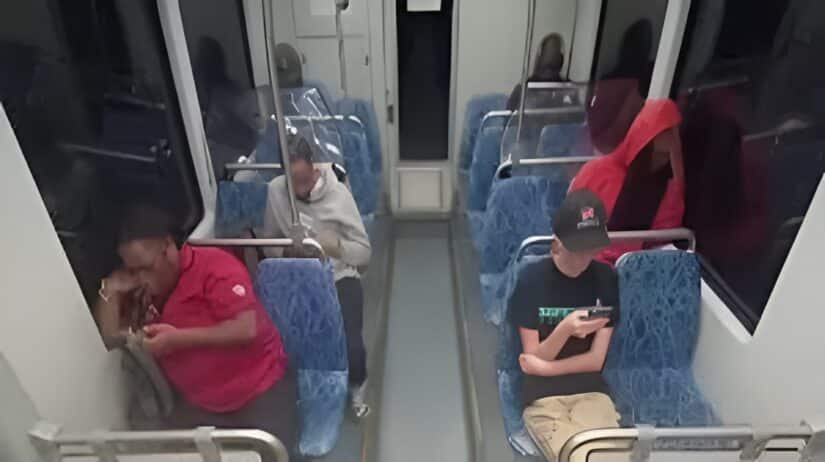
The tragic killing of a 23-year-old Ukrainian refugee on a North Carolina commuter train has drawn national and international attention. On a Blue Line train operated by the Charlotte Area Transit System, 34-year-old Decarlos Brown carried out a brutal attack that resulted in the horrific murder of Iryna Zarutska. Federal prosecutors have since filed a federal charge, citing the crime as one of violence committed on a mass transportation system with a dangerous weapon.
This shocking case of violent crime not only raises questions about public transit safety, but also exposes broader issues within the criminal justice system and criminal justice policies. The story is not just about one unprovoked attack, but about failures that span mental health services, law enforcement, and crime policies in North Carolina. Families, officials, and community leaders continue to demand justice while this case unfolds in court.
1. The Incident on Charlotte’s Blue Line
On August 22, 2025, surveillance cameras captured the events on the light-rail train. Decarlos Brown Jr, without provocation, pulled out a knife and stabbed Zarutska in the neck. The Ukrainian woman, who had fled war in her homeland to pursue her American dream, collapsed as passengers fled in terror. Witnesses later described it as a shocking crime that should never have happened.
Brown walked away calmly, leaving the train platform moments before being detained. His past included a criminal record, multiple arrests, and time spent behind bars for robbery. His history of mental illness and mental health issues raised concerns about how he was free on the streets at the time of this unprovoked attack.
2. Legal Charges Filed
State-Level Charges
The State of North Carolina charged Brown with first-degree murder, one of the most serious offenses under state murder charges. If convicted, he faces life in prison or a death sentence, although executions have not been carried out in the state for years.
Federal Charges
At the federal level, prosecutors issued a federal crime indictment for “committing an act causing death on a mass transportation system.” This federal criminal charge falls under the jurisdiction of the Criminal Division of the Justice Department. The U.S. Attorney Russ Ferguson announced that Brown could face the death penalty if convicted.
By charging Brown federally, authorities ensure there is no escape from accountability. Whether under federal crime statutes or state murder charges, the penalties are severe. Prosecutors may pursue additional charges as the case develops.
3. Criminal Justice System Under Scrutiny
This case revealed systemic failures in the criminal justice system. Despite his violent past and mental health space concerns, Brown was free due to criminal justice policies such as cashless bail. His mother later stated that he required a mental evaluation and ongoing access to mental health services, but instead he was allowed to roam freely.
Critics argue that Democratic leaders in charge of crime policies have been too lenient, allowing repeat offenders to commit shocking crimes. On the other hand, defenders highlight the need for stronger mental health space funding and better public transit security.
4. Political and Public Reaction
The White House, White House Press Secretary, and prominent figures such as Pam Bondi, Attorney General Pamela Bondi, Attorney General Bondi, Charlie Kirk, and Kash Patel have all commented on the case, some framing it as a political grandstand moment. Former President Trump used the tragedy to criticize US crime rates and highlight failings of North Carolina Crime management.
The case has also sparked debates about public transit safety, public transit security, and how the Federal Transit Administration should respond to growing risks on light rail trains across the country.
5. Broader Implications
Transit Safety
The killing raised urgent concerns about transit safety across public transit systems in the U.S. The Charlotte Transit Station has since increased visible policing and added new measures. Officials are calling for further support from the Federal Transit Administration to reduce risks of another brutal attack.
Mental Health and the Law
Brown’s case underscores how mental health issues intersect with criminal law. His prior encounters with the law revealed gaps in providing mental health services and mental evaluation for those with recurring offenses. This demonstrates a critical need to better integrate mental health space considerations into criminal justice policies.
Legal Ramifications
This case sets an important precedent for federal criminal charges related to attacks on public transit. Prosecutors have indicated that a death sentence is possible if evidence shows premeditation and use of a dangerous weapon.
6. Families, Justice, and Human Cost
The victim’s family released a family statement through their family lawyer, expressing grief and anger over the horrific murder. They emphasized that Zarutska had sought peace and opportunity as a Ukrainian immigrant, leaving behind her home country devastated by war. Her dream of safety in America ended on a Blue Line train in Charlotte, North Carolina.
Advocates continue pressing for reforms to ensure public transit safety and to prevent future tragedies. Family spokespersons have called for accountability, tougher crime policies, and resources dedicated to protecting vulnerable passengers.
7. Looking Ahead
As the trial progresses, Brown may face federal criminal charges, state murder charges, or even additional charges tied to his past offenses such as armed robbery. With the possibility of a death sentence or life in prison, the case is one of the most serious in recent North Carolina Crime history.
Observers note that the trial could have wider impacts on criminal justice policies, debates over mental health services, and the national conversation about public transit safety. Political commentary from the White House, Russ Ferguson, and community leaders will continue shaping public opinion.
Conclusion
The killing of a 23-year-old Ukrainian refugee on a North Carolina commuter train by Decarlos Brown Jr is more than a tragic loss, it highlights systemic failures, sparks political battles, and raises questions about public transit security and criminal justice policies. The pursuit of justice in this case will set precedents for future prosecutions involving violent crime, federal charge, and mental illness defenses.
About Ted Law firm
At Ted Law Firm, understands the weight carried by families affected by horrific murder cases, violent crime, and failures of the criminal justice system.We serve families across Aiken, Anderson, Charleston, Columbia, Greenville, Myrtle Beach, North Augusta and Orangeburg. We stand with victims’ families, ensuring their voices are heard and justice is pursued with diligence. Contact us today for a free consultation
